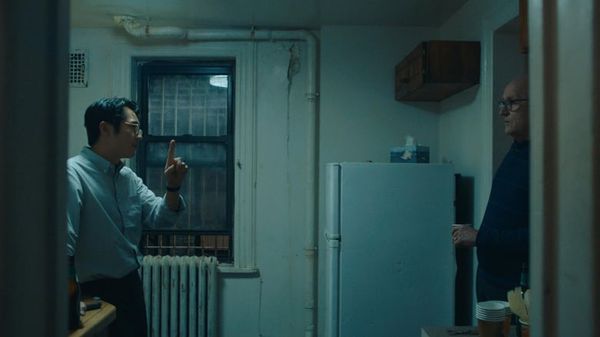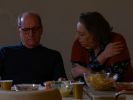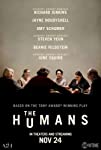Eye For Film >> Movies >> The Humans (2021) Film Review
The Humans
Reviewed by: Andrew Robertson

The title is not just indicative of the subject matter, but mentioned in one of the recurring elements. Dreams, or rather the recollection thereof. Not the blur between the oneiric and the awful as, perhaps, The Matrix Resurrections, but a different one. Painful narration of the personal, people talking in rooms.
Stephen Karam directs, a debut behind the camera. This though is his play. He wrote, directed it for the stage, in a run in that woolly 'off-Broadway' that saw it win four Tonys. That's more than West Side Story, though beyond genesis on New York Stage and being set within New York they've little else in common. Save, thankfully, that in their incarnation on film they have leveraged the things that film can do to differentiate themselves, to free themselves from the fixed gaze of the Gods and acquire a differently omniscient view.

There is a moment at the end that suggests how it was staged in the flesh, but that's as much a flourish, a bow. Before then we are bound deep in a place that feels more real than it probably is, a 'courtyard' apartment in a tenement block in Chinatown. The opening is circles in various versions of this, the sky like some blue rune drawn negatively by folded brownstone. When the camera ceases its skirl and slews into our space, its upstairs, its downstairs, its duplex that will be filled with duplicity, we are close, closer, closer still.
Lol Crawley's cinematography is full of detail. The blister of water behind paint, the glint and colour of water over paint, crack, pipe, oppressive red labyrinths and phallic graffito. Beyond that physical geography psychogeographies, faces, hands, shadows. The apartment is lit variously, that small daylight sliver through old windows, phones reflecting up at glasses looking down, candles, lanterns, doors. There's a shot framed to give us a sense of depth, three actors moving on parallel at different removes in a punctuated central corridor, past the mismatched card tables set up for Thanksgiving to the cast-iron spiral of a staircase. Anyone who has been in an old flat will recognise that mixture of the arcane and the profane. The mysterious trails, the bubbles, the sense that lurking behind the over-thick paint may be some amalgam of horsehair and asbestos, the graves of plasterboard vampires, a trifle of decay.
The family Blake are similarly patched and peeling. Jayne Houdyshell is mother, Deirdre; she was in the stage cast too. She was in the 2019 Little Women, but might be more familiar (as are many New York stage actors) as a minor, recurring role in the Law & Order franchise. She is joined by daughters Brigid (Beanie Feldman) and Aimee (Amy Schumer). Both are far better known for TV work, but both give strong performances in a complicated space. Their father, Erik, is played by Richard Jenkins. He's another 'That Guy', though his breakthrough on screen was as another haunting patriarch in Six Feet Under. His mother, "momo", played by veteran actress June Squibb. She's another of the Academy nominees in a small but stellar cast. Rounding out the dinner is Richard, played by Steven Yuen. He's done a huge amount of voice work, has a connection through Trollhunters to Guillermo del Toro that he shares with Jenkins who was in The Shape Of Water. Another actor probably better known from TV work, his appearances in Minari and Okja and this may now signal a further evolution of his career.
They're all astonishing. As with most everything in the A24 stable it looks amazing, but at root it is just people in rooms, talking. Sometimes talking about their dreams, which is to undersell it. In the movie theatre there is deep control of sound. I can't find a credited sound designer for the film but on stage it was Fitz Patton, who constructed things that might be thumps, that might be the trash compactor, that might do anything but go bump in the night. Booming from cinema speakers they form part of an oppression, a sensory totality, an imposition of tone through tone. They grab and insist as much as held breaths and shaken heads and tearful eyes and hands. Skip Lievsay is down as sound editor and there's plenty of work for cineaste stalwarts like Demme and the Coens and Scorsese in there, and that quality is reflected, resonant.
The word I found myself reaching for with Nico Muhly's score was 'big', like the infrequent bokeh and the patterns of light in glass it is always on the edge of comprehension. There are few shots that are not inside, that aren't up at the darkening sky. One is across the roof and it is helpful to know that one is towards the changed skyline to the Southwest, towards the Hudson. Elsewhere a moment from street level, Chinatown proper, basement shops, signs in English second if not third, fire escapes and antennae and illuminated signs accreted to the centuries old brick and stone like reaching vines from vinyl awnings. Eldridge Street in the low hundreds, near the Bowery, Seward Park. Gentrifying at that stage where the city is metastasising, the scavenging in the decay where new life, probably sourdough, will bloom.
"it shouldn't cost this much to live," and yet it does. Not just expenses, emotional burdens, more. There are six adults in the room, three parents, two romantic relationships, but there are changes. There are borrowings from the aesthetics of horror, not just jump scares but in a ratcheting unease, a disquiet. Creepy doesn't begin to cover it when there are five dollar words like unheimlich. There's diegetic music, also a section of Einstein on the Beach of Samuel Johnson and Philip Glass. Around it all, loss, grief, painted over, moved out, moved on, changing behind a façade that is probably leaden.
It is difficult to move from stage to screen. They are related disciplines but their divergence is perhaps as old as the building. The same care at the foundations is rewarded though, and where there is material to unearth The Humans has it in spades. It is emotional, powerful, perhaps achieving catharsis of a sort without actual resolution. Pots boil over and are not alone. Faces are covered. Things are unseen. In transition the camera gives us a proximity that no stage could accommodate, not theatre in the round, not immersive, not even another folding seat at that uneven table. It is a Thanksgiving dinner that is set and it is with gratitude that this effort should be met.
Reviewed on: 24 Dec 2021

















